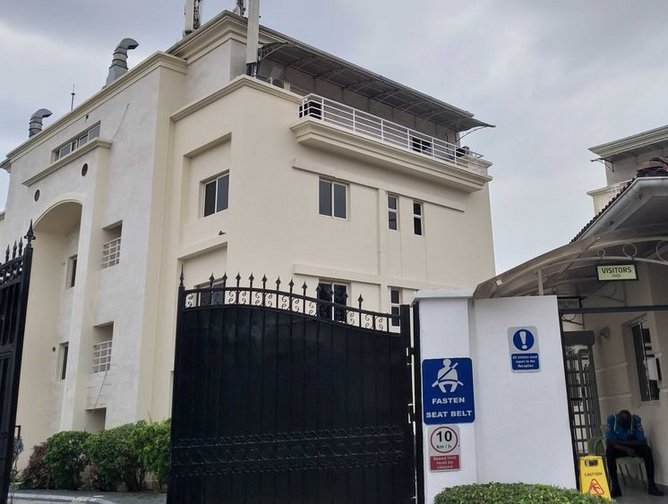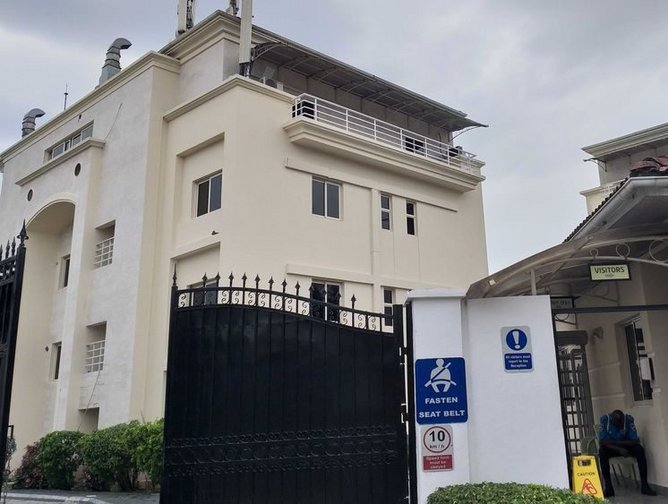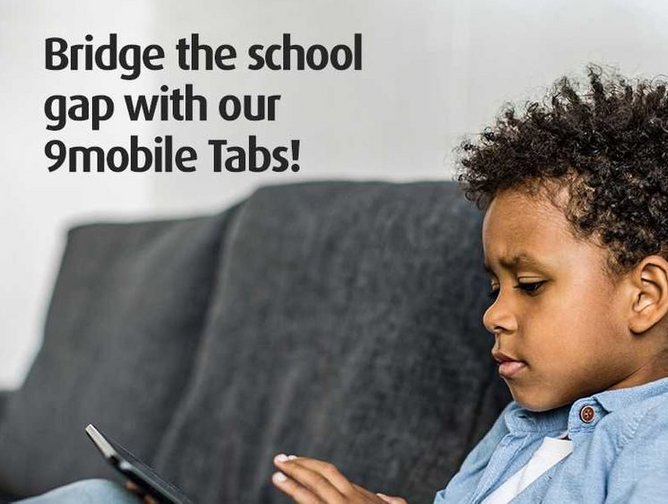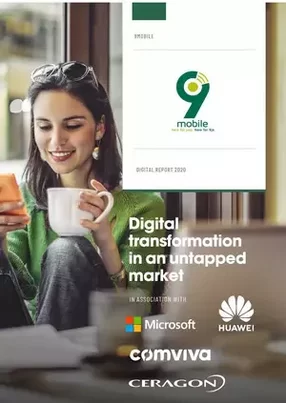Nigeria is a frontier market with huge reserves of untapped potential. A country of 206mn people, large portions of its market are underserved, both in terms of Telecommunications, Media & Technology (TMT) and, Banking. The country’s telecom market only has a mobile broadband data penetration rate of around 45%, and more than half of its citizens that are the right age to own a bank account are completely unbanked. “There’s huge growth potential here,” says Alan Sinfield, CEO of 9mobile.
Having accumulated multiple decades worth of experience, both in the banking sector and leading telecoms in frontier markets, Sinfield sees a wealth of opportunities for 9mobile to grow and evolve into a top-tier competitor in the Nigerian mobile industry. We sat down with him to discuss his vision for digitally transforming 9mobile, driving major fibre deployments throughout a geographically and politically diverse country, banking the unbanked, and nurturing a vibrant ecosystem of Nigerian companies in order to build a truly sustainable, valuable, home-grown MNO.
A golden opportunity
Founded in 2008 as Etisalat Nigeria, 9mobile rebranded in 2017 to better reflect both the company’s identity as a wholly-Nigerian owned, Nigerian-focused MNO, and its commitment to delivering innovative, best-in-class services to its customers. Currently, 9mobile is the fourth-largest telecom in Nigeria, a fact which Sinfield fully intends to remedy.
“There’s no reason for us to be in fourth position in this market. We have the same foundations from which to work from as the other operators in Nigeria, so when you compare our 13 million customers to the leading telecom players in the country, some of which have between 50 and 70 million, there’s no reason why we shouldn’t be in the same space,” he explains. “We have lofty goals, but every intention of achieving them.”
Embracing digital transformation from the inside out
Sinfield and 9mobile are in the process of acting on a five-year plan to transform the business into a leading competitor in the Nigerian telecom market. In order to realise the company’s full potential, Sinfield explains that new technologies have a key role to play, both in 9mobile’s internal operations and regarding the offerings to its customers.
“We’re in a fast-moving world. There’s so much happening right now around technological innovation, from AR and VR to robotics. A lot of what we’re looking at centres around applying the latest technological advancements within the operation to streamline and make it more effective,” he explains. “We’re also paying close attention to the evolution of IoT, and how best to adopt that technology internally, as well as how to use it to help customers’ businesses perform better.”
Externally, Sinfield explains, 9mobile’s technological advancements need to be rolled out in step with the expectations and demands of its customers. “It’s about understanding what the customers want, which is high-speed data at very affordable prices that works everywhere and when they need it,” a challenging feat in light of the sheer size and geographical diversity of the Nigerian market. Understanding the current capabilities of the mobile network in different parts of Nigeria is essential to elevating 9mobile’s offerings in a sustainable way.
“A lot of what we’re doing is based on tailoring our technical strategy to deliver right-sized coverage for the communities we’re serving,” Sinfield explains. “In some instances, 3G is legacy technology, but when you’re looking at rural communities that have had no access to data so far, the speeds you can get with 3G are mind-blowing in comparison.”
Mobile Banking for the unbanked
Of the 206 million people living in Nigeria, approximately half of that population is of an appropriate age to own a bank account. “Of that population, just over 50% of them are unbanked. That’s 50-million-plus people who don’t have access to banking services,” says Sinfield. Earlier this year, the company became one of the first firms in Nigeria to receive the government’s new payment service bank licenses, as part of the government’s new initiative to increase financial inclusion.
In response, 9mobile has spun out a dedicated banking business to compete in the country’s burgeoning fintech space. Given his experience in finance, and previous work with mobile money solutions in other frontier markets, Sinfield notes that developing the new offerings has been extremely exciting and is looking forward to the launch of the new 9PSB.
“What we’re developing is a standalone bank which is going to be an online service, but with additional elements of traditional retail banking,” he says, agreeing that the service will be something of a hybrid between a digital-only challenger bank like Revolut or Starling, and a more traditional financial institution.
“We’re going to have retail banking halls, as well as ATMs. The service itself can work on a host of different devices, from smartphones and tablets down to 2G feature phones. You don’t need to be on a smartphone or download an app to use it; the whole service works with USSD strings,” he says. “It’s more than just mobile money. We’ve got the capability for people to have savings accounts, remittance accounts, and more. It’s a great way for us to both enable our customers and to help the government achieve its financial inclusion goals. It really does open up opportunities as financial inclusion also drives digital inclusion, which will really support growth in Nigeria.”
Rolling out Fibre
While 9mobile already has an operational network consisting of close to 6,000km of fibre, Sinfield notes that the market still remains largely underserved. In the main, he explains, this is due to a long-standing state of affairs tied to multiple levels of federal and state regulatory control throughout the diverse political landscape that makes up Nigeria.
“One of the barriers, historically, to rolling out fibre in Nigeria is the fact that it’s such a large country made up of individual states with local governments, which means you’re dealing with multiple levels of government below the national level,” he elaborates. “What this means is that some places are charging for rights of way at rates that are just plain prohibitive.” The country’s minister for communications and digital economy, Dr. Isa Ali Ibrahim Pantami, has been instrumental, Sinfield adds, in challenging this status quo. “He’s convinced a lot of states that decreasing those up-front payments will lead to better adoption of ICT technology and more revenue in the long-term.” As a result, right of way charges are being dropped across the country, allowing 9mobile, as well as other MNOs and fibre companies, to roll out more infrastructure in support of the Government’s five year broadband plan.
However, even with government tariffs reduced, the expense of installing the necessary infrastructure itself can be prohibitive. “The cost of deploying fibre is very high,” remarks Sinfield. As a result, 9mobile has been forging alliances and partnerships with other Nigerian operators, creating a shared fibre network that could soon serve even the most isolated areas of the region. “It doesn’t make sense for all of us to dig the same hole and lay the same fibre. We already have deals in place with other operators to swap fibre; we’re building out a huge ecosystem throughout the entire country,” he adds.
Recreating the 9mobile culture
Every digital transformation, at its heart, lives or dies by the strength of a company’s people. 9mobile is no exception. Sinfield admits that, prior to his arrival, the company had experienced a few difficult years related to investment in infrastructure and other areas. “However, what we do have internally is a wealth of great human capital, that we will be further developing through investment in training, and career development,” he says. “What I’ve been doing since I’ve arrived is letting people know that we are turning things around. I’ve made it clear that in that process, everyone at 9mobile is an ambassador for the brand. If they don’t live, breathe and represent the brand then the company won’t succeed. The only way we will succeed is through teamwork.”
He adds that, in addition to improving training programs and delving deeper into the company’s core competencies to better understand the strategic changes that need to be made, he’s working to create a rewards-focused culture at 9mobile. “We want people to understand that, if they want to progress, they’ll have to put in the work, and that if they put in the work, they’re going to progress and be rewarded for helping to grow the business.”
Cultivating an ecosystem
As a wholly Nigerian-owned business, ensuring that 9mobile works to nurture and grow the ecosystem around it in a sustainable way is an essential goal for Sinfield and the company’s shareholders alike. “We have a strong focus on using local companies wherever we can to help give them a leg up, by investing and giving them our business,” he says. “As a wholly Nigerian-owned company, our shareholders want to invest in Nigeria and its communities, and that’s exactly what we’re going to do. We’re going to build a company that is sustainable and delivers real value to all of our stakeholders.”
Going forward, Sinfield says that customers, companies and shareholders can expect big things from 9mobile. He adds that he’s extremely grateful to the company’s loyal customers, who have continued to support them through past years, and that rewarding that loyalty is a top priority for the company. “We have a lot of new plans and ideas. A lot of our customers have stuck with us through thick and thin, and we want to make sure that we reward their loyalty while we continue to invest in our network and services for them,” he says.
“It’s not just at the consumer level though; Nigeria abounds with micro and SME-size companies, which are very underserved right now. We already work with a large number of those companies and I want to note that we’re very grateful for their continued patronage and support.”
Key Partnerships
“Our partners are key to ensuring that we achieve our business goals. We want to recognise where we’re strong, where they might be stronger, and make sure we’re leveraging the right alliances to ensure that both businesses mutually benefit” - Alan Sinfield, CEO, 9mobile.
Ceragon is one of our main network partners relating to microwave transmissions. They’re instrumental in making sure our data is hauled back to our network hubs and how we provide broadband connectivity to our customers in areas where we cannot immediately lay fibre. We work very closely with them and intend to continue to do so as we roll out more of our network.
Conviva does a lot with us in the area of value-added services. They’ve been working with 9mobile for a number of years and have a solid, evolving solution set that they provide to us.
Huawei is one of our core network vendors. They provide great service. They’re always helping us expand our technical capabilities and we’re continuing to explore new ways for them to be a part of our value chain going forward.
Microsoft is a major part of our future plans. They’re a key partner for everything we want to do and, in addition, they have some fantastic goals based around their CSR programs, so we’re working closely with them to ensure we make the most of the products and services they offer so we in turn can offer the best possible service to our customers.




